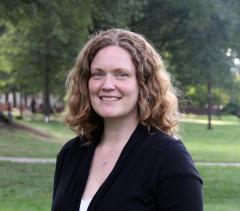Why Ph.D. at UMD?
Ph.D. Program
The doctoral program builds upon the department’s successful Master of Applied Anthropology (M.A.A.) degree and was begun in 2007. In our doctoral program, biological anthropology, archaeology, cultural and social anthropology, and anthropological linguistics work together to produce fertile training environments for graduate students and to facilitate powerfully integrated research projects. The department’s faculty encourages applicants for our doctoral program who are outstanding undergraduates, master’s level students in anthropology and related disciplines, and professionals in anthropology or in fields for which a doctorate in anthropology would be an ideal complement or final degree. We seek doctoral students who have proven a commitment to cultural and social anthropology, archaeology, anthropological linguistics, or biological anthropology and who have shown an understanding of how to use their professional knowledge in applying anthropological research to practical and applied circumstances. We seek to train professionals who come here in order to improve both their research and applications skills in the uses of anthropological knowledge. A major focus of the Doctor of Philosophy (Ph.D.) program is to direct original research and to encourage theoretical and methodological advancement in such a way as to reflect upon the specific practices of anthropology, with the aim of improving those practices and thereby increasing the value and usefulness of the discipline. Doctoral students are typically prepared for research and development careers outside of academic settings, as well as for academic careers in anthropology departments and other disciplinary settings.
We particularly encourage potential graduate students to enter this program who would like to use the scientific and scholarly traditions within the sub-disciplines to address problems within the one of our three areas of research concentration: environment, health, and heritage. Applicants to the Ph.D. program will be expected to indicate an interest in pursuing study related to one of these areas of concentration. Most faculty members maintain interests that intersect with one or more of the areas of concentration. Students seeking to pursue interests outside these areas may do so with departmental permission and the cooperation of a faculty advisor.
Degree Overview
Students entering the Ph.D. from a Bachelor’s degree must normally complete all the requirements for the M.A.A. degree, although the internship sequence can be substituted with additional coursework under approved circumstances. An additional minimum of 30 credit hours of advanced coursework is required, to include at least 12 credit hours of dissertation research.
For students entering the Ph.D. program from the M.A.A., an additional minimum of 30 credit hours of advanced coursework is required, to include at least 12 credit hours of dissertation research.
Students entering the Ph.D. program with a master’s degree from another institution are minimally required to complete the 18 credit hour core sequence of the M.A.A. program and an additional minimum of 30 credit hours of advanced coursework, to include at least 12 credit hours of dissertation research. These students are not normally required to complete the internship sequence, although in some cases their doctoral committee may decide an internship may be appropriate to enhance a student’s professional experience prior to graduation.
Additional supportive coursework may be required on a case-by-case basis depending on the qualifications of the student. In such cases, these expectations will be specified upon admission to the Ph.D. program. Substitutions for courses in the M.A.A. core sequence are rarely permitted and must be approved by the Graduate Committee and the Department Chair. Students admitted to the Ph.D. program advance to candidacy upon completion of a written comprehensive examination and an oral defense of their dissertation proposal. An oral defense upon completion of the dissertation is also required.
As part of our department's commitment to diversity, all faculty members in the department recognize the strong need to expand the numbers of underrepresented minorities in the discipline of anthropology and are therefore committed to training members of these groups at the Ph.D. level.
For more information on how to apply to UMD’s Ph.D. program in Anthropology, please see our Graduate Admission's Page

